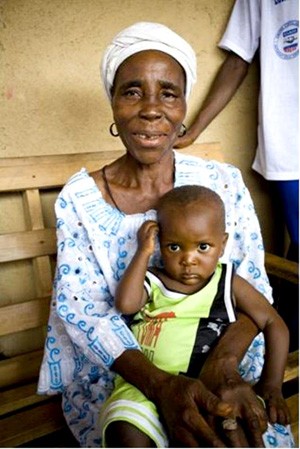
Sange and her husband rejoiced on the discovery of expecting a child. But six months after welcoming a healthy baby boy named Febyah, Sange passed away from an unknown illness. After his mother’s death, Febyah’s father abandoned him, leaving him with his maternal grandmother. In her late fifties and taking care of an infant, Fatta Mento did not have the resources or knowledge to keep Febyah nourished.
In June of 2009, USAID entered the village of Popalahun in Lofa County to conduct Behavior Change Community Education sessions. USAID is teaching women how to properly take care of their children. The women learn which healthy foods to prepare for their children; how to avoid malaria; how, when and where to wash hands; when they should go to the nearest health clinic or hospital; how and when to use Oral Rehydration Salts to stop diarrhea, and other important health tips. Mothers with malnourished children and those that have children from 6-36 months attend the weekly sessions.
The USAID team met Mento and a malnourished Febyah, and encouraged her to attend the health sessions. Now a healthy toddler, Febyah takes everything around him in through his beautiful, big brown eyes. Mento is grateful for the USAID program. “My mind now tells me that Febyah is coming on fine. I thank God for the program. I thank God,” she said.
Sharing what they learned in the sessions, the village women in Mento’s group know how to tell if a child is malnourished – by the color of their eyes, the swelling in their stomachs and feet, and the color of their hair. They speak of how malaria has gone down dramatically since the sessions started. Two of these women had lost children to malaria. Too many children had died of malnourishment to count. Their eyes express both regret and thankfulness for their newfound knowledge.
“Before, I didn’t know about malnutrition. Through the USAID program I found out that my child was a yellow card! I learned how to prepare food for my child and now he is a green card! Before, he didn’t have an appetite for food. Not anymore! I told my friends and they too are changing their ways,” said Kihed Kamara, another woman in Mento’s group helping to spread healthy practices in their Popalahun village.







Comment
Make a general inquiry or suggest an improvement.